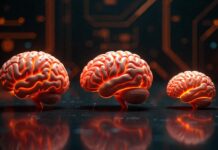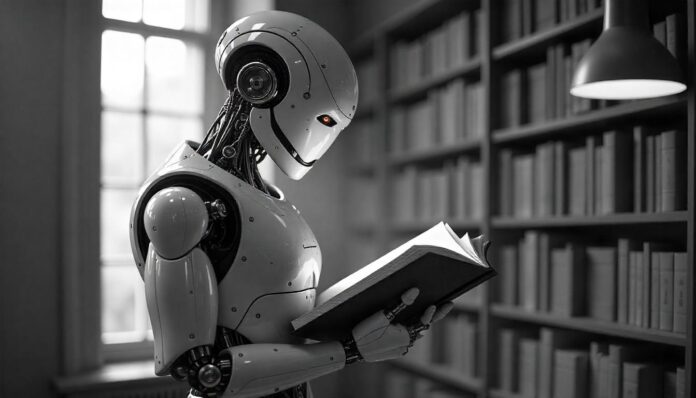
AI isn’t some vapor in the cloud or part of SF movies anymore. It’s real. Very real. It’s in our phones, our fridges, and even in our toasters. In one way it’s messing with our jobs, flirting with our relationships, and perhaps even changing the way how we learn and communicate.
If we’re going to keep up—or just survive—we probably want to read a book or two about this phenomenon called Artificial Intelligence.
And so, here are the top ten books about AI that are really worth flipping through. Some are perhaps weird. Some are brilliant. Some might scare the bejeezus out of you. And many won’t give you comfort.
But they might give you something better—clues. Glimpses into what might happen and how AI might change our world forever.
If you’re the kind of person who wants to read the warning labels while everyone else is pressing buttons, this list is for you.
Welcome to the glitch!
1. Artificial Intelligence: A Guide for Thinking Humans by Melanie Mitchell
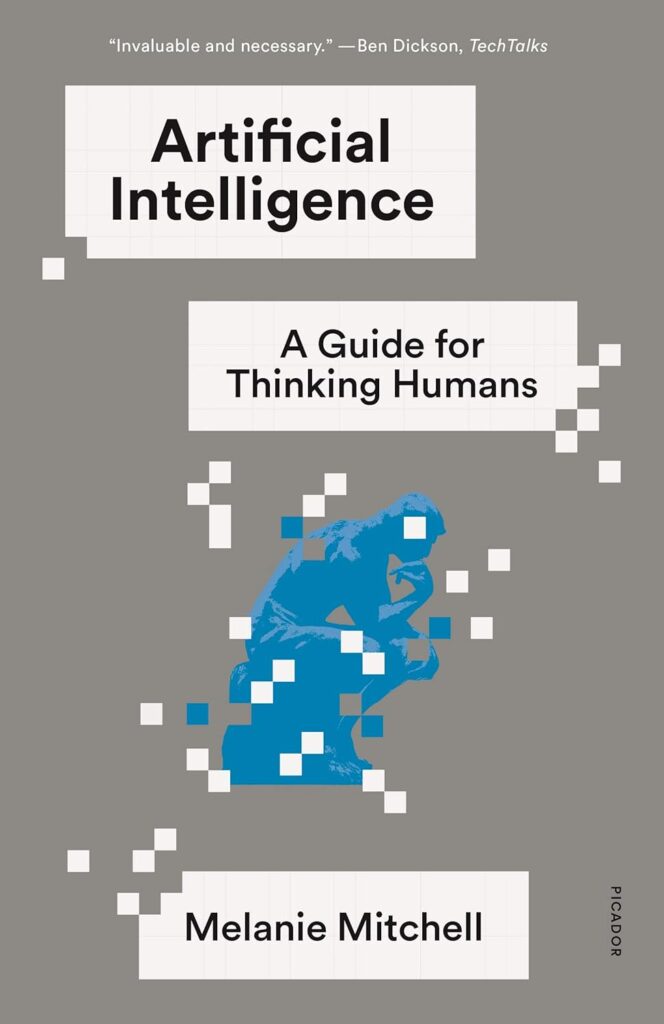
In Artificial Intelligence: A Guide for Thinking Humans, professor and researcher Melanie Mitchell takes readers through a comprehensive exploration of AI’s current state, its potential future, and the ethical dilemmas it raises.
The book presents AI not as a monolithic force but as a field filled with complexity, challenges, and questions. Mitchell’s writing is very accessible, making the complicated nature of AI easy to understand for non-experts, while also providing deep insights into the technology for those with more experience.
Mitchell covers key developments in AI, such as machine learning, neural networks, and natural language processing, while addressing the significant hurdles the field still faces.
She explores the question of whether AI can ever truly replicate human intelligence and what it means for humanity if it does. The book balances optimism about AI’s potential with caution about its unintended consequences, providing a balanced view that allows readers to critically examine the promises and risks associated with the technology.
Interesting fact: Melanie Mitchell's background in cognitive science provides a unique perspective, allowing her to compare AI's current capabilities with human cognition in a way that few other authors can.
2. The Singularity Is Nearer: When We Merge with AI by Ray Kurzweil
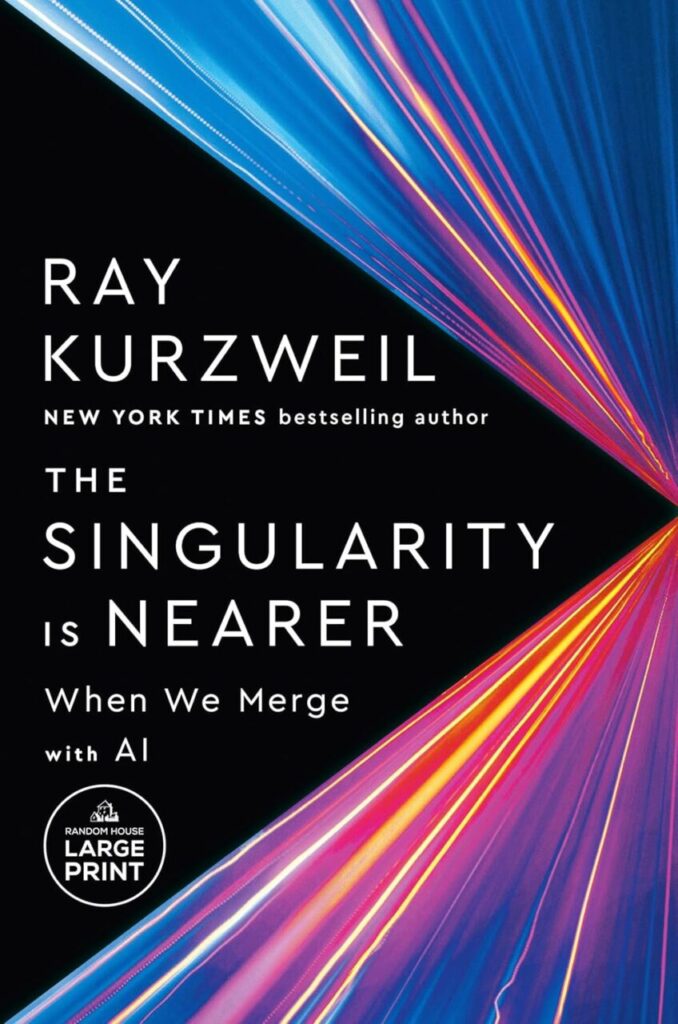
In The Singularity Is Nearer, Ray Kurzweil, a renowned futurist and inventor, extends his vision from his earlier work, The Singularity Is Near, to explore the future of AI and its merging with human intelligence.
Kurzweil discusses the rapid progress in fields like nanotechnology, biotechnology, and AI, arguing that by the mid-21st century, human beings will begin merging with machines, creating a new era in human evolution.
Kurzweil’s vision of the future is both optimistic and cautionary, with predictions that humans will be able to enhance their cognitive and physical abilities through AI integration.
The book also delves into the ethical and philosophical implications of such a merger, as well as the potential risks of AI surpassing human intelligence. By exploring both the technical and societal aspects of the singularity, Kurzweil provides a balanced perspective on how this monumental shift might unfold.
Interesting fact: Kurzweil predicts that by 2029, AI will reach human-level intelligence, a milestone that will pave the way for the singularity. He has been an advocate for using AI to enhance human capabilities for over two decades.
3. The Alignment Problem: Machine Learning and Human Values by Brian Christian
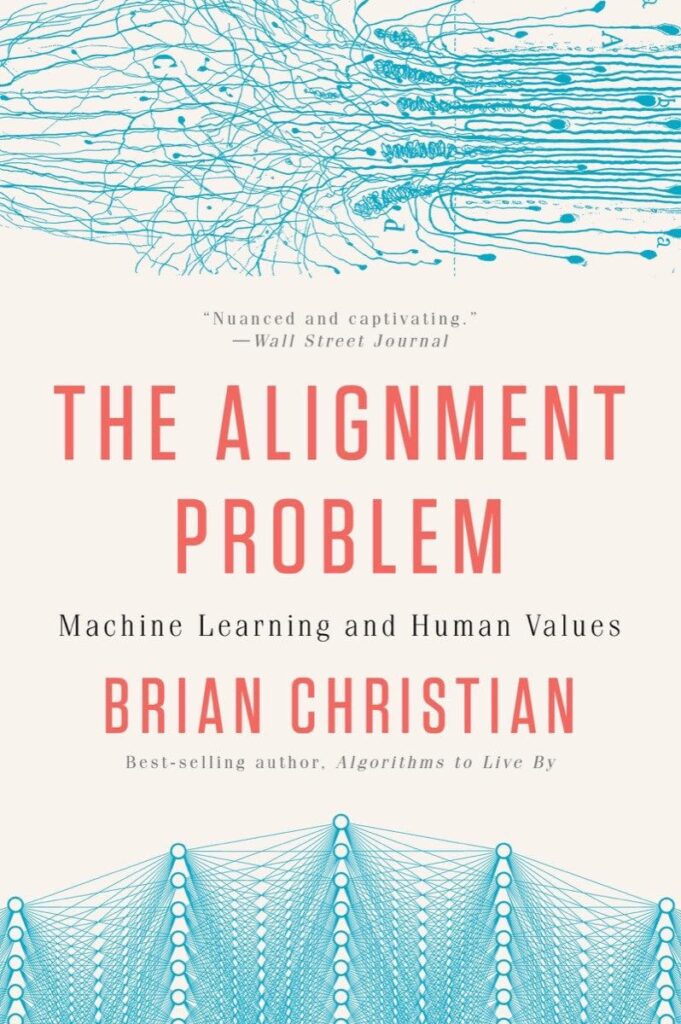
In this amazing book, Brian Christian dives deep into one of the most urgent challenges facing AI researchers: ensuring that AI systems align with human values.
As AI models become more complex, ensuring they act in ways that are beneficial and ethical has become a critical issue. Christian explores the technical difficulties of creating AI that can accurately understand and reflect human intentions, as well as the potential consequences when they don’t.
Through detailed accounts of AI failures, interviews with leading researchers, and an exploration of machine learning’s inner workings, Christian explains the challenges and potential solutions to this “alignment problem.” The book provides insights into how AI systems can misinterpret data, make biased decisions, and behave in unpredictable ways.
It also tackles the broader societal implications, offering suggestions on how to regulate AI to ensure it really serves the greater good.
Interesting fact: Christian’s interdisciplinary approach combines computer science, philosophy, and cognitive science, making the complex topic of AI alignment accessible to a wide audience.
4. Supremacy: AI, ChatGPT, and the Race That Will Change the World by Parmy Olson
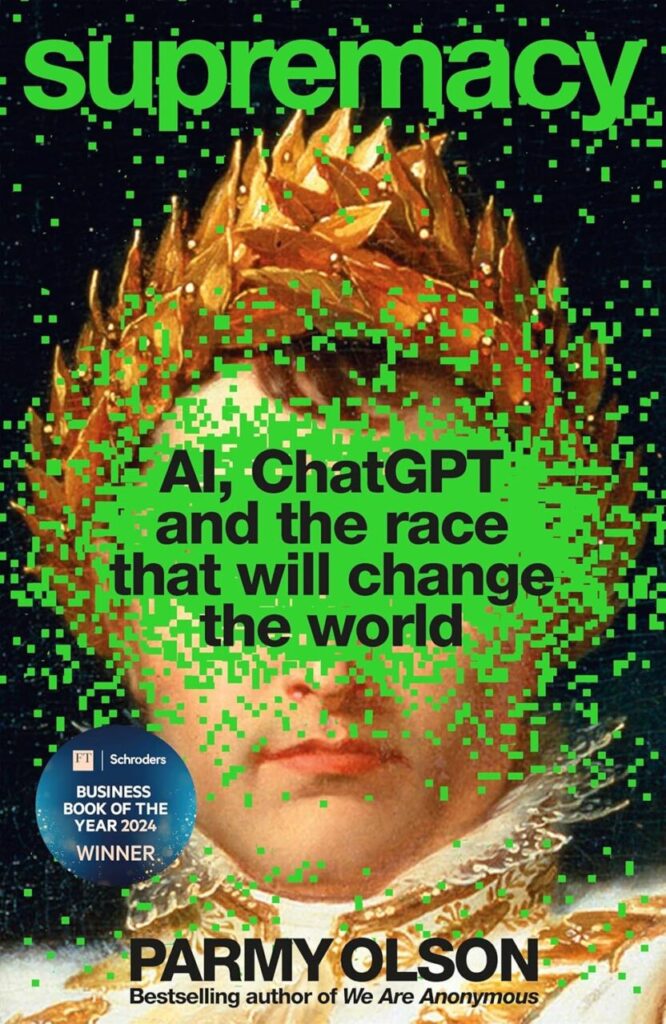
In Supremacy, journalist Parmy Olson takes readers on an interesting journey into the heart of the AI arms race. The book delves into the intense competition between tech giants like Google and OpenAI, to achieve breakthroughs in artificial intelligence. Olson covers the evolution of AI from its humble beginnings to the rise of advanced models like ChatGPT, highlighting the battles between leading AI firms and the personalities driving these innovations.
Olson explores the motivations behind these organizations and the global implications of AI dominance. The book covers pivotal moments in the race for AI supremacy, such as the launch of ChatGPT and its unsettling impact on industries like content creation, customer service, and more.
Through interviews and research, Olson paints a vivid picture of the power struggles and ambitions that define the AI landscape today.
Interesting fact: Olson reveals that during the development of ChatGPT, several major AI companies secretly conducted covert tests to one-up each other, leading to a series of rapid, sometimes cutthroat, advancements in AI capabilities.
5. Nexus: A Brief History of Information Networks from the Stone Age to AI by Yuval Noah Harari
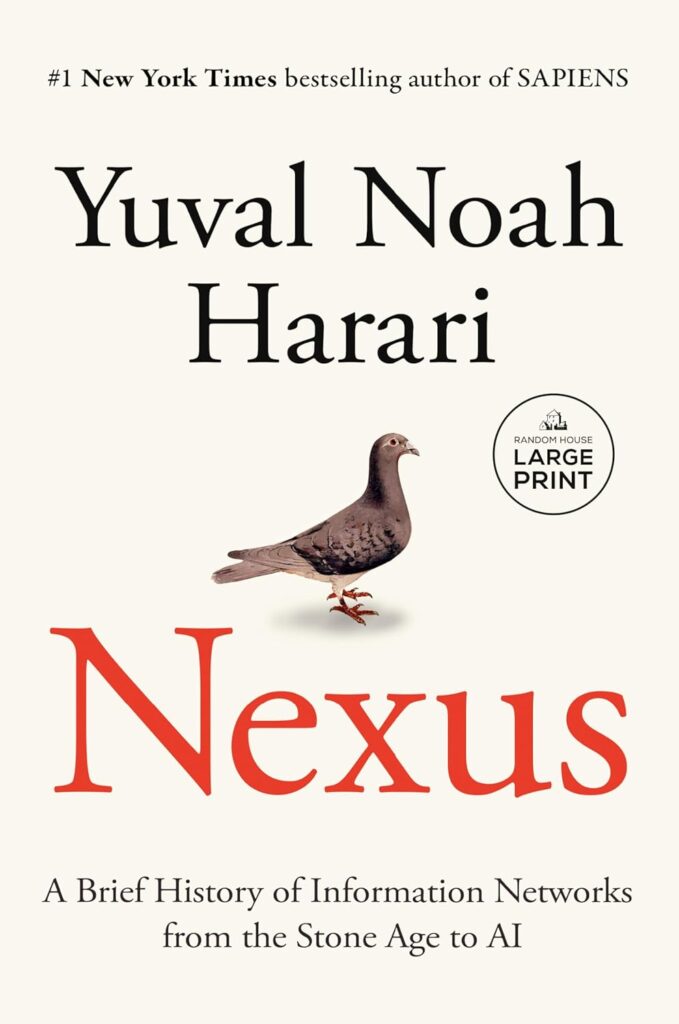
In Nexus, Harari offers a comprehensive look at the evolution of information networks. From the invention of writing to the development of the internet, Harari traces the ways in which humans have constructed networks of information and communication.
The book researches the rise of digital technologies, culminating in the transformative power of artificial intelligence in the 21st century.
Harari argues that AI represents the latest stage in this ongoing evolution, offering both immense promise and unprecedented challenges. The book explores how AI systems are changing the nature of communication, the economy, and even human cognition.
Additionally, Harari examines the role of AI in shaping global power structures, its potential to disrupt industries and the societal questions that arise from its integration into daily life.
Interesting fact: Harari warns that AI represents a new kind of "alien intelligence," one that humans may not fully understand or control, posing existential risks if left unchecked.
6. Transcend: Unlocking Humanity in the Age of AI by Faisal Hoque
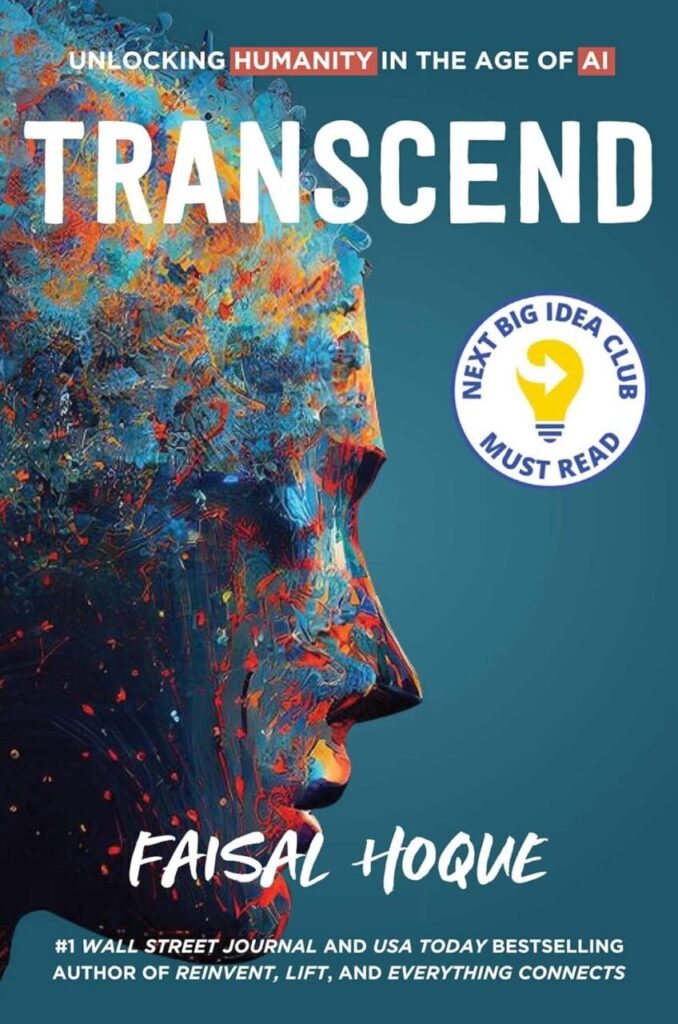
In Transcend, Faisal Hoque takes a human-centered approach to the future of AI. Rather than focusing solely on the technical aspects of AI, Hoque emphasizes how people can adapt to and thrive in an AI-powered world.
The book highlights the importance of emotional intelligence, ethical considerations, and personal growth as AI technologies continue to evolve and become more integrated into everyday life.
Hoque argues that, as AI automates more tasks and augments human capabilities, individuals must focus on developing skills that machines cannot replicate—namely, creativity, empathy, and critical thinking.
The book also offers practical advice for organizations looking to implement AI in a way that enhances rather than replaces human potential. Hoque’s philosophy centers on AI being a tool to enhance human experiences rather than diminish them.
Interesting fact: Hoque’s insights are informed by his extensive background in both technology and business, making the book relevant not only to tech enthusiasts but also to executives and leaders looking to integrate AI into their organizations.
7. Searches: Selfhood in the Digital Age by Vauhini Vara
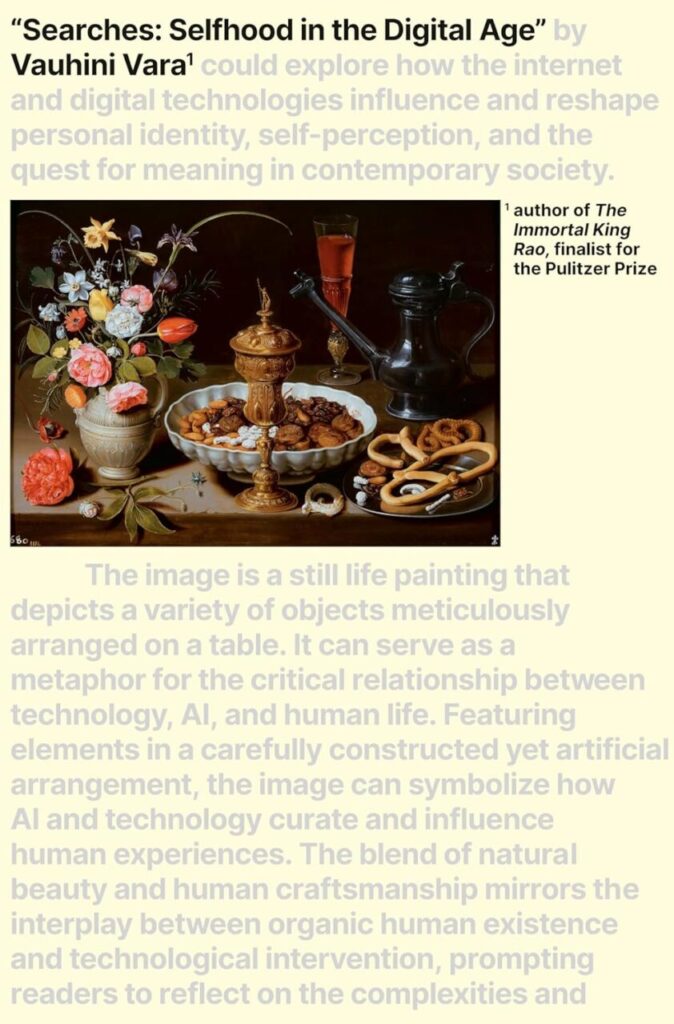
In Searches: Selfhood in the Digital Age, Vauhini Vara explores the intersection of digital technologies, AI, and human identity. Vara examines how AI-driven platforms like search engines, social media, and recommendation systems shape how we perceive ourselves and navigate the world.
The book combines personal narrative with cultural analysis to explore how digital environments influence our relationships, sense of self, and decision-making processes.
Vara also discusses the impact of AI on our daily lives, focusing on how it affects everything from our sense of agency to our mental health. Additionally, she explores the ways in which AI and digital technologies challenge traditional notions of privacy and autonomy.
The book is really a thought-provoking exploration of how AI is not only transforming our external world but also our inner experiences.
Interesting fact: Vara’s background as a technology journalist gives her a unique perspective on how AI has permeated everyday life, particularly in shaping our online identities and self-image.
8. The AI Con: How to Fight Big Tech’s Hype and Create the Future We Want by Emily M. Bender and Alex Hanna
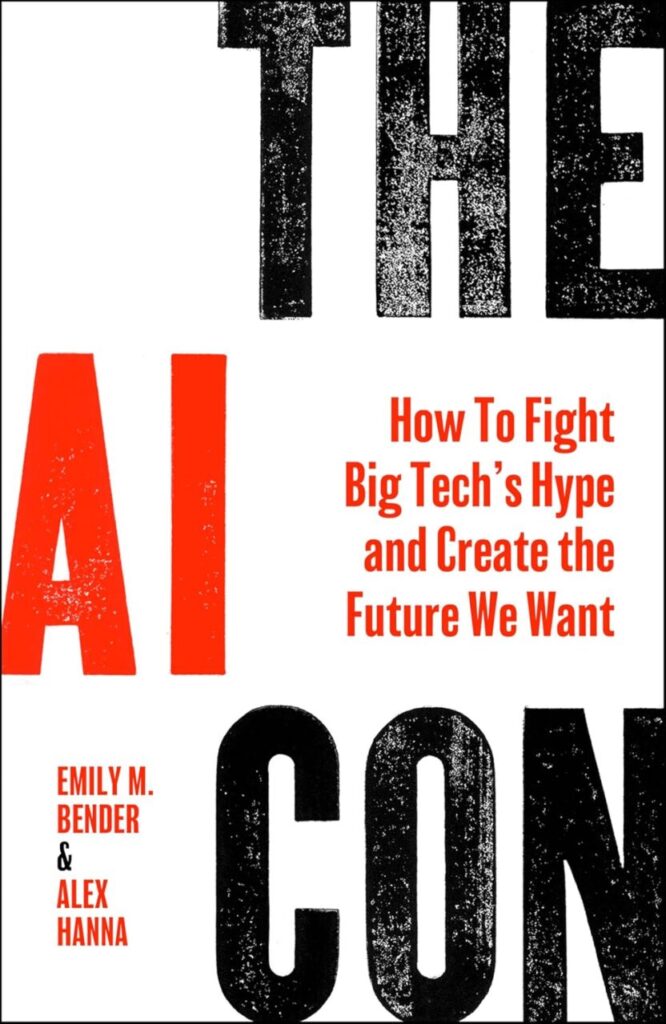
This really interesting book by Emily M. Bender and Alex Hanna is a critical examination of the narratives promoted by major tech companies about artificial intelligence.
The authors argue that much of the hype surrounding AI is driven by corporate interests, often at the expense of ethical considerations, societal well-being, and transparency.
Bender and Hanna also highlight the dangers of unchecked AI development, particularly when it is driven by a profit motive rather than the public good. They discuss the biases embedded in AI systems, the potential for job displacement, and the challenges of regulating technology that is evolving at an exponential rate. Basically the book advocates for a more equitable and transparent approach to AI, one that involves public engagement and ethical oversight.
Interesting fact: Bender and Hanna are vocal critics of "AI utopianism," arguing that many of the promises made by big tech companies about AI’s capabilities are misleading or overly optimistic.
9. The Age of Em: Work, Love, and Life when Robots Rule the Earth by Robin Hanson
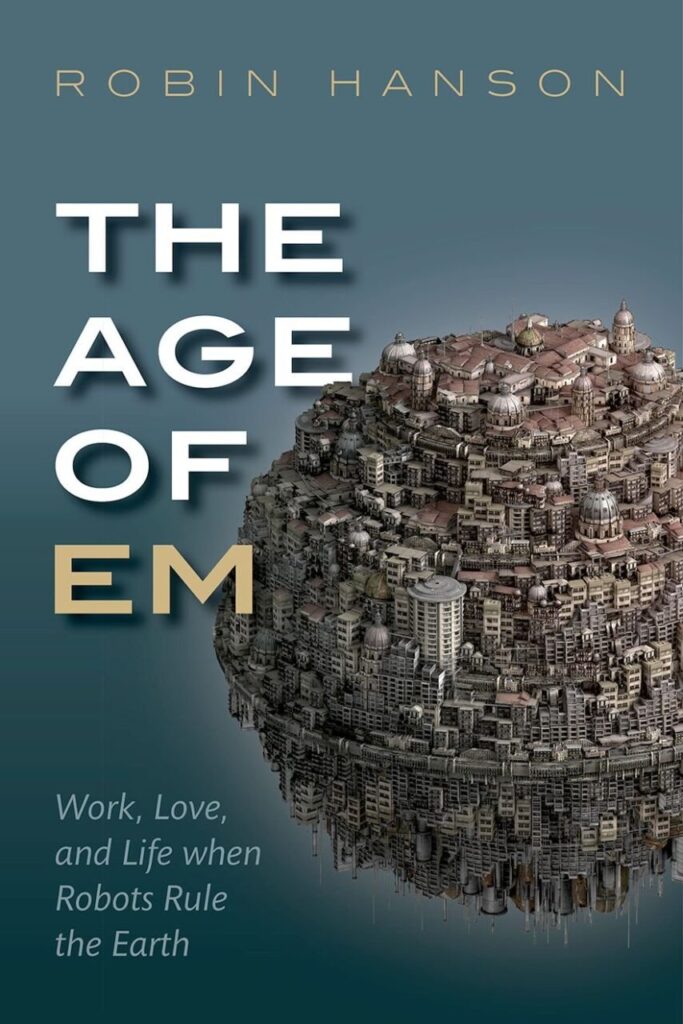
In The Age of Em, economist Robin Hanson explores a future in which human minds are uploaded into computer systems, creating “brain emulations” or “uploads.” These digital versions of humans would live and work in virtual environments, interacting with each other and the world around them in ways that we cannot yet fully comprehend.
Hanson discusses the potential societal changes this technological leap could bring, such as the collapse of traditional labor markets and the rise of a new class structure based on computational intelligence.
The book examines the economic, social, and philosophical implications of a world where consciousness can be digitized and replicated, and where physical death is no longer a certainty.
Interesting fact: Hanson’s work on brain emulation is a radical exploration of the potential future of human consciousness, presenting both utopian and dystopian scenarios depending on how this technology is governed.
10. AI 2041: Ten Visions for Our Future by Kai-Fu Lee
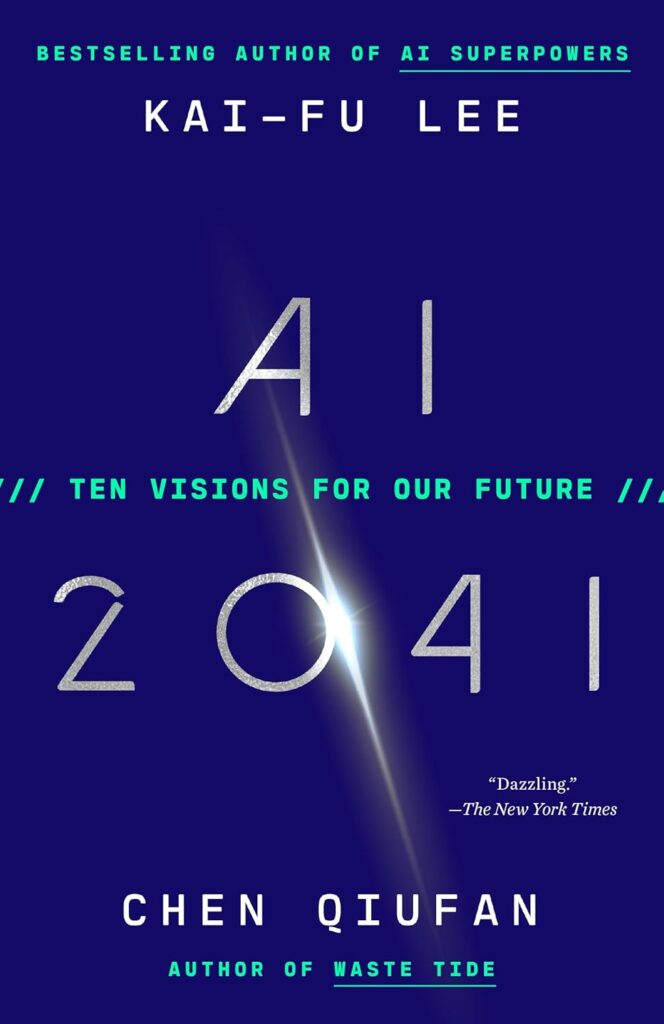
In AI 2041: Ten Visions for Our Future, Kai-Fu Lee, a well-known AI expert and venture capitalist, offers a compelling look at how AI will evolve over the next two decades. The book presents ten futuristic scenarios that explore the potential impact of AI on various industries, from healthcare to education, transportation, and beyond.
Lee pairs each vision with a deeper exploration of the underlying technology, providing readers with a balanced understanding of both the benefits and risks of AI. Through a combination of storytelling and technical analysis, Lee brings the future of AI to life in a way that is accessible and engaging.
The book serves as both a primer on AI technologies and a meditation on the huge ways these technologies will shape our lives.
Interesting fact: Lee is not only a leading AI expert but also a passionate advocate for using AI to address global challenges, such as climate change and inequality.






















